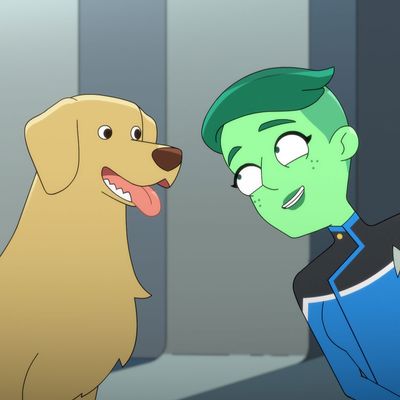
The seventh episode of Star Trek: Lower Decks starts out with a lot of promise. We get some new pairings in Boimler and Rutherford, and later Boimler and Tendi. And it looks at first as though Mariner will be forced to reckon with the fact that she might not be all that she thinks she is, capable of facing down any situation with extreme competence.
WeÔÇÖve known for a while that Mariner was under-ranked compared to her experience, and in ÔÇ£Much Ado about Boimler,ÔÇØ we see how far below her colleagues she actually is: Her friend is a captain, leading an ace team of intrepid Starfleet officers, while Mariner is seemingly wasting time in the lower decks of the Cerritos. When Captain Ramsey assigns Mariner to her team as first officer, Mariner proceeds to bungle every assignment sheÔÇÖs given. The fact that the rest of RamseyÔÇÖs team is excellent at what they do makes Mariner look even more incompetent, which is frankly new for her.
ItÔÇÖs a refreshing story line. While MarinerÔÇÖs laissez-faire attitude is extremely amusing, and understandable in some respects ÔÇö the bureaucracy of Starfleet can be terrible ÔÇö the flip side is that sometimes protocol works efficiently and well, especially when youÔÇÖre in a life-or-death situation. Constantly trying to undermine it isnÔÇÖt exactly a flattering character trait, and Mariner had to confront that in this episode.
Only it turns out that Mariner was failing on purpose. She knew that Ramsey wanted to recruit her, and she wasnÔÇÖt interested ÔÇö so Mariner sabotaged herself. On one hand, I get the frustration of being happy where you are as other people constantly try to get you to move onward and upward. But on the other, Mariner was complaining about her mother, Captain Freeman, trying to force her daughter to transfer. How is sabotaging yourself so someone doesnÔÇÖt try to hire you any more mature than that? I understand MarinerÔÇÖs point in theory, but it doesnÔÇÖt really play well here.
Also, of course there are teams of substitute command officers in Starfleet to take over for a captain when they are on leave or on a mission. It only makes sense! This is a thing I hadnÔÇÖt thought much about previously, but having people who do this as their permanent jobs makes complete sense. One thing I absolutely love about this show is that the writers have clearly thought about the practicalities of living in this kind of future, and the administrative challenges people will have to face in an organization like Starfleet.
The other story line of the episode tackles a different question: What happens to the Starfleet officers involved in accidents that canÔÇÖt be solved in a 40-minute (give or take) episode? The answer, apparently, is that they are sent to a mysterious farm to live out their lives in luxury. Only, as Boimler discovers, the ship full of misfits is actually doomed to go nowhere,; there is no farm, there is only the hellscape of the ship.
The details of this plotline are well done, from the annoying transporter sound Boimler makes when heÔÇÖs out of phase, to the creepy jailer with the very awkward third arm coming out of the middle of his chest. I admit I was taken in by those kinds of details, so I didnÔÇÖt see either of the twists coming ÔÇö that Mariner was faking her incompetence, or that there really was a utopic farm in the accident victimsÔÇÖ future.
Before Boimler gets there, though, he becomes involved in a rebellion. The denizens of the ship have become convinced they are stuck there forever (communication is key!) and have decided to revolt, taking Boimler with them. In classic Boimler fashion, he sneaks away and tattles on the rebels, because following rules is his happy place. In the end, though, all is well, and Boimler rematerializes back to normal. ItÔÇÖs hard to tell time frames in this episode, but it seems like Dr. TÔÇÖAna shipped Boimler off awfully quickly. Either the pacing was off, as juxtaposed against the Mariner scenes, or the Cerritos didnÔÇÖt even try to wait it out to see if Boimler would recover before sending him to the Farm. How sad!
Despite all the promise in its setup, though, in the end, this episode delivered the exact same answers weÔÇÖve gotten from previous episodes this season. ItÔÇÖs in keeping with the genre and format of the show (character development just works differently in a half-hour animated comedy versus an hour-long sci-fi drama), but at this point itÔÇÖs frustrating that weÔÇÖre getting the same lessons over and over again with no further depth. We understand that Mariner is ├£ber-competent. We get that Tendi likes weird experiments. (Also, despite being on the ship with Boimler, we barely saw her in this episode!) ItÔÇÖs time to see something new. And what about giving Tendi or Rutherford an A-plot once in a while?
IÔÇÖm being a bit harsh here because I expect a lot out of Lower Decks. ItÔÇÖs smart and funny and very well written. The plots are enjoyable, the jokes are genuinely good and deep; but weÔÇÖre seven episodes in, and I donÔÇÖt know much more about these characters than I did from the pilot. The show has found its rhythm, but weÔÇÖre still seeing the same pairings, the same character focuses, the same type of personal-growth story lines. IÔÇÖm ready for the show to give us something new.
CaptainÔÇÖs Log:
ÔÇó Would Tuvix have ended up on the Farm, had he been allowed to live and not cut short by my lovable murder captain?
ÔÇó TendiÔÇÖs distaste for actual dogs is amazing.
ÔÇó Captain Freeman in her ÔÇ£Chain of CommandÔÇØÔÇôtype uniform and mission, excellent.
ÔÇó I hope we see more of Captain Ramsey, especially with Ransom.
ÔÇó The alien at the end of the episode is very reminiscent of the ones from Farpoint, right?

